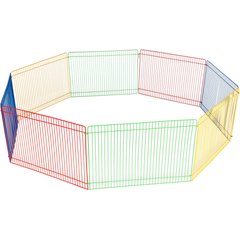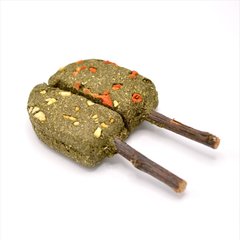Hedgehog Care Sheet: Habitat, Food, and Care
yul38885 yul38885/iStock / Getty Images Plus via Getty Images
Hedgehog Species Overview
Hedgehogs are small nocturnal mammals that are blanketed with spikes along their backs. Like porcupines, hedgehogs have these quills for protections against predators.
However, hedgehog quills are not barbed and do not puncture the skin—but they can still hurt if handled improperly.
But can you have a hedgehog as a pet?
The answer is yes, you can have a hedgehog as a pet—but due to their quills and specific care, hedgehogs are not ideal for young children.
These spiny friends require a clean, comfortable hedgehog habitat and daily socialization in the evenings from their pet parents.
Hedgehogs can thrive living alone and do not need to be kept with other hedgehogs.
Occasionally, two females may be housed together but it’s typically recommended for hedgehogs to live alone. Additionally, they should not be housed with any other species in their enclosure.
Hedgehogs can be extremely shy at first but are social animals at heart.
They like to ball up in a natural defense position, but with patience and daily social interaction, your hedgehog will start to feel safe and content with you.
When hedgehogs chirp, whistle, or purr, it indicates they feel comfortable. Snorting, clicking, or hissing indicates fear or aggression.
Hedgehog Characteristics
| Difficulty of Care | Intermediate |
| Average Lifespan | 5–8 years |
| Average Adult Size | 24–35 centimeters |
| Diet | Insectivore |
| Minimum Enclosure Requirements | 2' x 3' floor space |
How Long Do Pet Hedgehogs Live?
With proper care, pet hedgehogs can live 6 years or more. Many can even live up to 8 years old.
Regular vet visits, nurturing pet parents, and preventative care can help hedgehogs live longer.
Wild hedgehogs usually live to be about only 3 years old.
How Big Do Hedgehogs Get?
Pet hedgehogs are small, adorable creatures that are usually around 1 pound (453 grams) when they are full grown.
Male hedgehogs are usually larger at 400–600 grams and females are usually 300–400 grams.
Hedgehog Care
Let's take a look at a few key components of caring for hedgehogs.
Hedgehog Handling
Hedgehogs have prickly quills along their back to protect them from predators. They are shy animals and will roll up into a tight ball and hide their face if they are frightened.
Always approach a hedgehog slowly and handle them with a small towel so you don’t prick yourself on one of their quills.
It’s important to include daily socializing time outside of the cage to help them get used to you and get comfortable with being handled.
Hedgehog Habitat
Enclosure
Hedgehogs require an enclosure that is at minimum 3 x 2 feet for floor dimensions. The ideal habitat has wire sides–no more than 1 inch apart with a flat bottom such as plastic to prevent pressure sores on their feet. Wire sides provide adequate ventilation.
The habitat should have a secure lid because hedgehogs like to climb.
Environment
House your hedgehog in an area that you spend the most amount of time in–like your living room or bedroom so that they can spend time with you.
Hedgehog Temperature
Their home should not be in direct sunlight or in a drafty area. Optimal temperature is between 70–85 F; hedgehogs can overheat over 85 F.
If the temperature falls below 65 F hedgehogs will become less active, and this can cause a compromised immune system. Humidity in their room should be low, less than 40%.
A heating pad can be placed under part of the enclosure, or a ceramic heat emitter may be used to provide more heat as needed. It is ideal to have a temperature gradient in the enclosure, with one area warmer and the other cooler.
Bedding
Provide your hedgehog with at least 3–4 inches deep of high-quality paper bedding or crumbled paper.
Hedgehogs like to burrow so the more bedding the better for them. Recycled paper bedding and towels or blankets are often used inside the enclosure.
Remove any strings from the towels or blankets because these pieces could wrap around a hedgehog’s legs or feet.
Avoid clay or clumping litter and wood shavings as it can be ingested by the hedgehog and cause medical issues.
Feeding Dishes
A heavy bowl for food and water should be provided. Some hedgehogs will drink from a water bottle, and some prefer a bowl.
Other
Hedgehogs can be litter box trained.
Make sure the box has an opening low enough for them to climb in easily. Place it in the corner of the cage with paper-based litter inside.
You can also add hide boxes, fleece sleep sacks, PVC tubing, and cardboard boxes to the enclosure.
What Do Hedgehogs Eat?
Hedgehogs are insectivores and omnivores.
This means they eat insects, plant material and occasionally baby mammals, mollusks, snails, and worms.
Main Food
Domesticated hedgehogs should be fed a hedgehog pelleted diet every day.
Depending on your hedgehog’s weight and activity level, feed 3–4 teaspoons of hedgehog pellets per day.
Since hedgehogs are nocturnal it's best to feed them at night.
Gut-loaded insects (i.e., five mealworms, one cricket) can be offered a few times a week.
One to two teaspoons of fresh produce can be offered daily to every other day.
Water
Fresh water should always be available in a water bottle or shallow bowl and changed daily.
Treats
Mealworms, crickets, earthworms, and waxworms can be fed up to three times per week.
Offer fresh fruit and vegetables weekly. These include:
-
Peas
-
Corn
-
Carrots
-
Apples
-
Bananas
These vegetables should all be cooked to prevent them from getting stuck on the roof your hedgehog’s mouth.
Supplements
Hedgehogs do not require vitamins or supplements unless otherwise directed by your veterinarian.
Foods to Avoid
Do not feed your hedgehog:
-
Celery or lettuce (low nutritional value)
-
Avocados
-
Raw meats
-
Raw eggs
-
Nuts
-
Seeds
-
Dairy products
-
Hard raw foods such as carrots
Do not offer your hedgehog any other items without checking with your veterinarian first.
Grooming and Care for Hedgehogs
Grooming
Bathe your hedgehog to remove any fecal material using a hedgehog-safe shampoo that’s fragrance-free.
Exercise
In their native habitat, hedgehogs travel long distances. Because of this, exercise is important for pet hedgehogs.
A flat exercise wheel is a great way for them to exercise as well as supervised roaming sessions outside of their enclosure.
Disinfecting and Cleaning
Cages should be emptied and cleaned at least once a week with soap and water.
Bedding should be replaced weekly.
Food and water bowls should be cleaned daily with soap and water. Your hedgehog’s cage should be spot cleaned once a day to remove and feces, wet/soiled bedding, and leftover food.
Enrichment and Training
When a hedgehog is presented with a new object or smell, they will lick, bite, or hold material in their mouth, and make a frothy saliva.
They will then apply the saliva to their spine with their tongue. This behavior can last minutes or up to one hour, and helps the hedgehog become better acquainted and comfortable.
In addition to exercise wheels, you can also provide them with swimming tubs outside their enclosure.
Hedgehogs like to climb, dig, swim, and jog on ramps, and climb structures and cardboard tubes inside their enclosure.
Make sure to provide your hedgehog with toys to encourage enrichment.
Hedgehog Health
Hedgehogs require annual checkups with your exotic veterinarian.
In addition to physical exam, blood work or X-rays may be recommended.
Signs of a Healthy Pet
Signs of healthy hedgehogs include:
-
Eating and drinking well
-
Healthy quills
-
Bright eyes
-
Walking and climbing without limping
-
Breathing comfortably without eye or nose discharge
-
Being active and playful at night
When To Call Your Vet
Signs that you should schedule an appointment with your veterinarian include:
-
Soft/loose poop
-
Not eating or drinking well
-
Quill loss
-
Muscle tremors
-
Wobbly gait
-
Lethargy
-
Eye or nose discharge
-
Overall decreased activity
If you have any concerns about your hedgehog, consult with your veterinarian immediately.
Common Illnesses in Hedgehogs
Hedgehogs commonly suffer from:
-
Corneal ulcers
-
Dental disease
-
Dilated cardiomyopathy
-
Cancer
-
Obesity
-
Wobbly hedgehog syndrome
Hedgehog Care Sheet FAQs
Are hedgehogs good pets?
Hedgehogs can make good pets for the right person that is able to care for them properly.
Hedgehogs don’t make a good pet for young children (less than 5 years old) as their sharp quills and desire to be solo creatures make some less able to be handled often.
Where can you get a hedgehog?
There are a few places where you can get a hedgehog. You may look for a hedgehog breeder or adopt one from a rescue.
Asking your veterinarian or your local exotics veterinarian for recommendations is a great place to start—they might be able to point you in the right direction.
How much does a hedgehog cost?
To understand the cost of a hedgehog, you must consider not only the cost of the hedgehog himself, but also how much money it will take to set up the proper environment for him, as well as providing toys, food, treats, etc. throughout his life.
Hedgehogs themselves can cost anywhere from $100–$600, depending on where you get them from.
Do hedgehogs let you pet them?
If you get a pet hedgehog when they are young, they are more likely to let you pet them often. Hedgehogs are usually more social when they have been raised by pet parents or breeders.
Are hedgehogs aggressive?
Hedgehogs are not considered aggressive animals. However, they might not be friendly if they are not familiar with people and have not been handled at a young age.
Hedgehogs like to live alone and if they are forced to live together, some can get aggressive.





